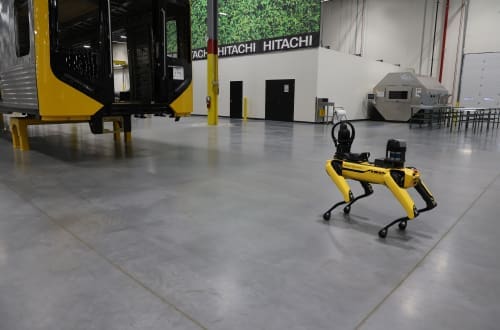- Services
Technology Capabilities
Technology Capabilities- Product Strategy & Experience DesignDefine software-driven value chains, create purposeful interactions, and develop new segments and offerings.
- Digital Business TransformationAdvance your digital transformation journey.
- Intelligence EngineeringLeverage data and AI to transform products, operations, and outcomes.
- Software Product EngineeringCreate high-value products faster with AI-powered and human-driven engineering.
- Technology ModernizationTackle technology modernization with approaches that reduce risk and maximize impact.
- Embedded Engineering & IT/OT TransformationDevelop embedded software and hardware. Build IoT and IT/OT solutions.
- Industries
- GlobalLogic VelocityAI
- Insights
BlogsDecember 16, 2024Gene LeybzonAccelerating Digital Transformation with Structured AI Outputs
This code produces the following output that can be imported into the candidate trackin...
 BlogsOctober 30, 2024Yuriy Yuzifovich
BlogsOctober 30, 2024Yuriy YuzifovichAccelerating Enterprise Value with AI
Discover how financial services integrations are transforming from standalone offerings...

- About Us
Press ReleaseGlobalLogicSeptember 23, 2025Hitachi agrees to acquire German data and AI services firm ...
Strengthening GlobalLogic’s data and consulting capabilities and expanding footprint in...
 Press ReleaseGlobalLogicSeptember 10, 2025
Press ReleaseGlobalLogicSeptember 10, 2025GlobalLogic and Ericsson Deploy Private 5G Network at Hitachi ...
The new infrastructure is the digital backbone of the Hagerstown plant, enhancing effic...

- Careers
Published on November 24, 2025Building responsible innovation at scale: Lessons from Financial Services leaders
View all articles Vivek DagaGroup Vice President and Head of UK&I and Emerging Markets
Vivek DagaGroup Vice President and Head of UK&I and Emerging Markets
Industry Leader, Financial Services and Consumer, EMEAShareRelated Content Ihor Tolkushyn12 February 2026
Ihor Tolkushyn12 February 2026 GlobalLogic13 January 2026View All Insights
GlobalLogic13 January 2026View All Insights GlobalLogic13 January 2026Recommended authorsSenior Manager, EngineeringDirector, Industrial BU GSPView all authorsSenior Vice President & Head of EMEA
GlobalLogic13 January 2026Recommended authorsSenior Manager, EngineeringDirector, Industrial BU GSPView all authorsSenior Vice President & Head of EMEALet's start engineering impact together
GlobalLogic provides unique experience and expertise at the intersection of data, design, and engineering.
Get in touchJust 46% of financial services firms convene cross-functional teams at the start of their innovation journey. That was among the findings of new research conducted by FT Longitude on behalf of GlobalLogic. The study reveals that while they should be building bridges, most Financial Services institutions are still operating in silos. But as Jitender Malhotra of NatWest Group explains, breaking through silos is both possible and essential for transforming compliance into a catalyst for innovation.
Moving from friction to flow
Malhotra, VP of Data Analytics, is leading NatWest’s responsible AI initiative. He acknowledges that the traditional model of isolated teams—that is, “one technology team, one risk team, one security team”—creates points of friction that slow innovation. At NatWest, they’re working to change that through multi-skilled teams with diverse representation. That way, he says, “you get all these perspectives … as you’re building the product.”
This approach directly addresses what GlobalLogic’s research identifies as a critical gap. With less than half of firms—and just one-third of banks—forming truly cross-functional teams from the outset, most institutions are hampering their transformation efforts before they even begin.
NatWest’s solution involves bringing together senior stakeholders from technology, security, risk, and AI ethics into what Malhotra calls “transformation programs”—unified efforts in which different skills and personas collaborate from day one.
Compliance as catalyst, not constraint
While some may view AI governance as a barrier to speed, Malhotra sees it as opportunity. His perspective aligns with another key research finding: that companies implementing mature AI governance frameworks report an average annual ROI of 340%.
“These regulations that are coming up, they actually help us to make sure that whatever we build, in terms of AI, is sustainable over a long period of time,” Malhotra explains. So while some firms race to market, those with robust governance frameworks will be the ones that build enduring solutions.
As Malhotra explains, NatWest embraces what it calls intelligent risk taking (IRT)—an approach that acknowledges that no decision is 100% risk-free. Rather than being paralyzed by doubts, they document pros and cons, make informed choices, and then move forward with clarity about potential tradeoffs.
Build consensus (without sacrificing speed)
Historically, technology has operated at the intersection of product (which clamors for speed) and compliance (which demands assurance). How can multi-skilled teams make effective decisions amid this classic tension?
Malhotra describes a structured but agile approach: “We float out the agenda that these are some of the decisions we’re looking to achieve. And then we talk about the pros and cons of each option … and make sure that it kind of builds consensus all around on every key decision that we take.”
His insight mirrors what GlobalLogic’s study reveals about high performers: Leaders do more than bring teams together. They also create operational models that enable rapid decision-making across functions. At NatWest, data and analytics serves as the “hub” in the organization’s hub-and-spoke model, facilitating conversations among business teams, security, supply chain, and finance.
A critical shift in mindset
Perhaps most importantly, Malhotra is candid about the goal of “future-proofing” any transformation: “Whatever work that we do in terms of ‘future-proofing’ ourselves, I’m pretty sure that 99% of us would actually end up being on the wrong side of it. We will get it wrong, but that’s something that you should… learn to accept.”
Given rapid changes across regulations, technologies, and customer expectations, the ability to adapt matters more than the ability to predict. As he explains, success comes from “constantly challenging yourself, constantly thinking about what could go wrong.”
Three strategies for scaling responsible innovation
For anyone leading responsible innovation, Malhotra offers these practical strategies:
1. Start with the problem, not the structure. Rather than forcing innovation through existing organizational silos, design teams around the challenges you’re tackling. Create multi-skilled teams that own outcomes (not just activities).
2. Build governance into the foundation. Embed risk, security, and ethics considerations from the experimentation phase through production, creating what Malhotra calls “appropriate mechanisms” at every stage.
3. Embrace intelligent failure. Finally, create frameworks for smart risk-taking that document decisions, anticipate challenges, and learn from setbacks. As Malhotra notes, the name of the game is continuous refinement and improvement.
Ready to transform silos into synergies?
The ability to deploy teams effectively and responsibly distinguishes Financial Services leaders from laggards. Consider a free discovery workshop to explore how GlobalLogic can help. It could be a critical first step toward building the multi-skilled teams and governance frameworks you need to transform responsible AI from compliance requirement to competitive advantage.
Loading...
 How can I help you?
How can I help you?
Hi there — how can I assist you today?
Explore our services, industries, career opportunities, and more.
Powered by Gemini. GenAI responses may be inaccurate—please verify. By using this chat, you agree to GlobalLogic's Terms of Service and Privacy Policy.
